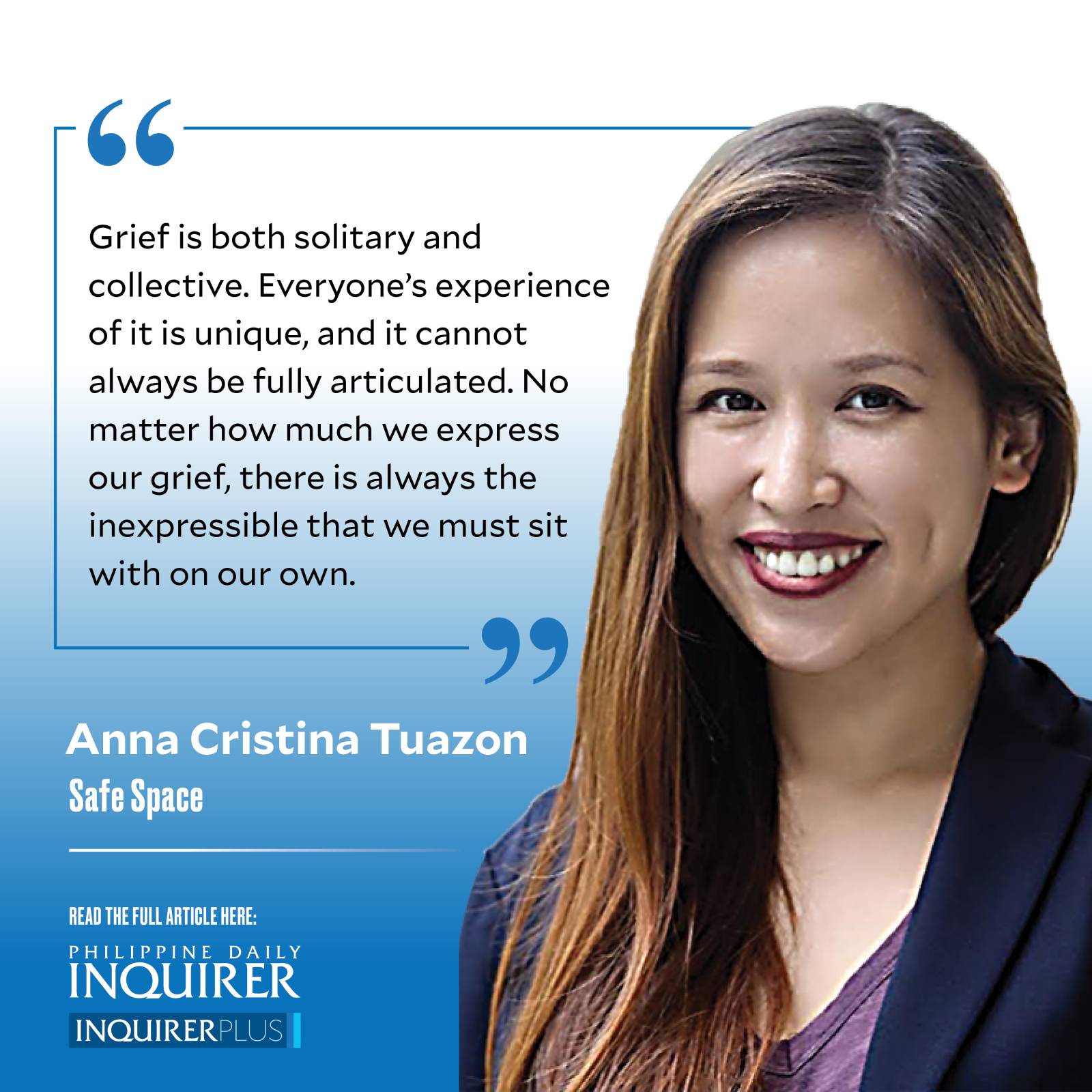The many faces of grief

People sometimes ask me whether their grief is normal. Most worry that they’ve been grieving too long; others get concerned that they might not be feeling as strongly as they should. I assure them that there is no absolute right way to grieve. Everybody goes through it in their own way at their own pace.
My grandfather suddenly passed away a few days ago. We were there when it happened, and I bore witness to the whole process, from the emergency room to the mortuary. I experienced firsthand what my clients described as the absurdly logistical process of death: choosing a casket some mere minutes later and surprising myself that I even cared about its color and style. I gained a newfound respect toward my family—for my parents, who performed CPR, and for my younger brother, who comforted me like a kuya and took charge of decisions whenever I could not. This is apparently how my family grieves—with a quiet sense of duty and simply focusing on what needs to be done. In a way, this is how I’d describe my Lolo as well. He was someone who took responsibility seriously and without fuss. I mentioned him in my inaugural article for Safe Space, describing him as someone who took a volcanic eruption in stride. When COVID hit the country, he took to his restrictions without much complaint (except when it came to accessing his barber).
Article continues after this advertisementGrief is both solitary and collective. Everyone’s experience of it is unique, and it cannot always be fully articulated. No matter how much we express our grief, there is always the inexpressible that we must sit with on our own. At the same time, communal mourning in the Philippines is something I’m very thankful for. We are from a small town, and it felt as if everybody was helping us. Before we knew it, there was more food than we knew what to do with. Flowers and wreaths soon filled the room and spilled out into the hallway. Relatives set up novenas and guided us through the ceremonial protocols. We had folks who just happened to notice a familiar name on the mortuary board and peeked in to extend their condolence. We barely needed to let people know; somehow, they just did. Neighbors came and shared stories. My Lolo was someone’s uncle, someone’s brother, someone’s childhood friend. At some point, the local Knights of Columbus came in and laid the Philippine flag on his casket, and set up all the sigils that reminded us that my Lolo was once a Grand Knight, a role he treasured.
As someone who mostly saw my grandfather as a quiet and stern figure, who in the mornings would solemnly dip pandesal in his coffee, it was as if I was getting to know him for the first time through other people’s stories. Someone described how he joked a lot and enjoyed talking about the NBA playoffs. My distant aunts and uncles played around like mischievous nieces and nephews as they imagined being scolded by their late uncle. I even realized that I had a different grandfather from my cousins—he was an affectionate bear of a babysitter for some of them, while I experienced him more as a stoic giant who highly valued his personal space. While at times I wish I experienced his cuddlier side, he never imposed any expectations, and was genuinely content with however we chose to live our lives (and who we dated). For that, I am eternally grateful.
Grief has many faces and many tools at its disposal. Grief reminisces, regaling us with Lolo’s adventures so we can take comfort that he lived a good life. Grief also distracts, making us focus on the social and hosting protocols to help lessen that feeling of helplessness. Grief urges us to seek company and not bear it alone. At other times, grief invites us into solitude, giving us the courage to face our innermost thoughts and fears. Grief appreciates. It reminds us of what is truly important. Even the regret that sometimes comes with grief can be healthy—it reminds us to never take opportunities for granted. Grief reminds us that even though life is temporary, and people can leave us, the gifts they impart are immortal. My Lolo exemplified uncompromising principles, living with quiet dignity while remaining generous to others. He has handed down those values to my father, and I hope to live up to that ideal.
Article continues after this advertisementGrief has many layers. It is rarely straightforward and tends to come in waves. We are barely through the first wave. The first dinner without him was surreal. Christmas will be the next challenge. The focus is also necessarily multitargeted: We have to hold both our own emotional process, as well as of those who were left behind. There is no need to struggle against grief; we just need to trust in the process.
——————
aatuazon@up.edu.ph
















